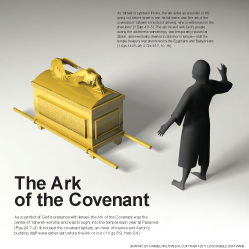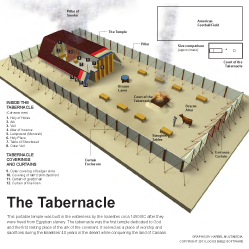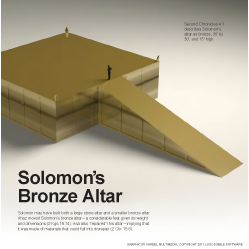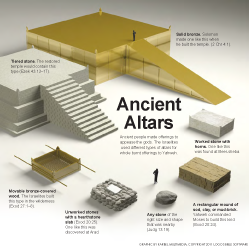8:1–11 The installation of the ark of the covenant in the most holy place (holy of holies) marks the end of the temple’s construction (chs. 6–7) and signifies the presence of God. According to some ot traditions, including vv. 1–11, Yahweh sits enthroned on top of the ark and may be transported from place to place (1 Sam 4:4; 2 Sam 6:2; 2 Kgs 19:15; 1 Chr 13:6; Psa 99:1; Isa 37:16). The ark was previously housed in the city of David, in the tent David pitched for it (2 Sam 6; 1 Kgs 8:1). A detailed description of the ark appears in Exod 25:10–22. |
8:1 from the city of David The Israelites kept the ark of the covenant in the city of David in a tent David pitched for it (2 Sam 6).
8:2 the men of Israel The Hebrew phrase used here, ish yisra’el, specifies a group of men—possibly the army.
Ethnaim The seventh month in the Phoenician calendar (Aug—Sept), one of several Phoenician month names to appear in this narrative (see 1 Kgs 6:1 and note).
(Aug—Sept), one of several Phoenician month names to appear in this narrative (see 1 Kgs 6:1 and note).
 Calendars in Old Testament Times
Calendars in Old Testament Times
festival Refers to Succoth or the Feast of Booths (or Tabernacles) (Lev 23:33–43; Num 29:12–40; Deut 16:13–15).
(or Tabernacles) (Lev 23:33–43; Num 29:12–40; Deut 16:13–15).
 Israelite Festivals Table
Israelite Festivals Table
8:3 priests Traditional custodians of the ark of the covenant (Deut 31:9; 2 Sam 15:24).
8:4 the tent of assembly Refers to the holy place associated with Moses and the desert wandering period of the Israelite people (Exod 26; 36:8–38). The tent of meeting is rarely mentioned in the books of Joshua—Kings (Josh 18:1; 19:51; 1 Sam 2:22).
the holy vessels Refers to the vessels associated with the tent of meeting (Exod 25–30; 35–40).
8:5 could not be counted A similar phrase is used to describe the weight of the bronze objects made by Solomon (1 Kgs 7:47).
8:6 the inner sanctuary of See 6:5 and note; 6:19 and note; 6:27 and note.
the house Refers to the house of Yahweh (chs. 6–7).
the most holy place The Hebrew phrase used here, qodesh haqqodashim, also appears in priestly descriptions of the area reserved for the ark of the covenant in the tabernacle (see Exod 26:33–34; Num 4:4, 19).
(see Exod 26:33–34; Num 4:4, 19).
the wings of the cherubim See 1 Kings 6:23–28; note on 6:23.
8:8 the ends of the poles The poles’ length is unspecified (Exod 25:13–15), but the inner sanctuary measures 20 cubits (30 feet) in each direction (1 Kgs 6:20).
holy place The Hebrew word used here, qodesh, refers to the outer sanctuary leading up to the inner sanctuary, or most holy place (holy of holies).
8:9 except the two tablets of stone By the time of the nt, traditions about what was in the ark of the covenant had grown to include a golden urn holding the manna, and Aaron’s staff that budded, in addition to the stone tablets (see Heb 9:4). See Exod 24:7–8, 12; 25:21; 40:20; Deut 10:2–5.
8:10 cloud The common description of God’s appearance throughout the wilderness wanderings of the Israelite people (see Exod 16:10; 33:9). At times, fire is included in this description (e.g., Exod 24:17).
8:11 were not able to stand to minister because of the presence of the cloud Similarly, Moses could not enter the most holy place (holy of holies) of the tabernacle when the cloud filled the tent (Exod 40:34–35). The presence of the cloud signifies that Yahweh now resides in the temple (see Exod 40:34).
8:12–21 Solomon’s blessing recalls the covenant |
8:12 Yahweh has said that he would dwell Solomon faced the temple and the cloud when he spoke these words (see 1 Kgs 8:14).
very thick cloud The Hebrew word used here, araphel, describes a thick darkness that masks God’s glory (v. 11) and permits approach (compare Exod 20:21; Deut 4:11; 5:22; Job 22:13). The word araphel is often paired with anan (meaning “cloud”), where God resides (1 Kgs 8:10–11; Deut 4:11; 5:22; Psa 97:2). Such imagery is intended to convey God’s power and numinous qualities (2 Sam 22:10; Pss 18:1; 97:2).
8:13 a place for you to live forever This reference to an earthly abode stands in tension with other verses in this chapter that insist that God lives in the heavens (1 Kings 8:39, 43, 49; compare Exod 15:17; Isa 66:1).
 The Name Theology of the Old Testament
The Name Theology of the Old Testament
8:16 I have not chosen a city Here, the building is delayed because God had yet to choose a city. According to 2 Sam 7:6–7, the building is delayed because God had not yet commanded Israel to build a temple.
 The Name Theology of the Old Testament
The Name Theology of the Old Testament
I have chosen David to be over my people God chose David as king, and David chose Jerusalem as his capital (2 Sam 5:6–10).
8:17 David my father desired The word levav means “inner-person,” “mind,” “will,” or “heart.” People in the ancient Near East associated the heart with comprehension, not emotion.
8:19 who has come from your loins Echoes 2 Sam 7:12–13. In 2 Sam 7:12, a parallel phrase means “from your body.”
8:20 I sit on the throne of Israel See 2 Sam 7:12–13.
I have built the house See 1 Kgs 6–7.
8:21 I have provided a place there for the ark See vv. 1–11.
8:22–53 After blessing Yahweh before the assembly (vv. 12–21), Solomon turns toward the altar and recites a lengthy prayer. He begins by reiterating that he is the fulfillment of God’s promise to David (vv. 23–26; 2 Sam 7:13–17), hinting that his throne will be established forever (2 Sam 7:16). He then focuses on many of the same themes as the book of Deuteronomy, including the consequences of disobedience and the desire for justice (1 Kings 8:31–53). The theological and practical content of the prayer suggests that the author has two audiences in mind: Yahweh and whoever hears or reads the prayer. |
 The Name Theology of the Old Testament
The Name Theology of the Old Testament
8:22 stood before A posture of prayer (compare Jer 18:20; Psa 106:30; Neh 9:2).
the altar of Yahweh The only altar mentioned in the building narrative is the incense altar in the most holy place, also called the holy of holies (1 Kgs 6:20, 22). The sacrificial altar is not mentioned in the account of the temple building or the lists of furnishings (chs. 6–7), but it appears later (vv. 31, 64; 9:25; 2 Kgs 16:10–16; 2 Chr 4:1).
he spread out his hands A posture expressing need or help during prayer or supplication (see Exod 9:29; Psa 88:9; Isa 1:15; 65:2; Lam 1:17; 2:19; 3:41).
to the heavens Refers to the sky.
8:23 keeping the covenant and the loyal love The Hebrew text here literally reads, “keeping the covenant and the steadfast love.”
covenant Solomon may have a specific covenant in mind, or he may be speaking of God’s covenants in general. The mention of a promise to David in 1 Kings 8:24 suggests that he has the Davidic Covenant in mind (2 Sam 7:1–17).
in mind (2 Sam 7:1–17).
loyal love The Hebrew word used here, chesed, also means “loyalty” or “reciprocal love,” depending on the context.
who are walking before The Hebrew phrase used here, halakh liphne, means “to serve” and always appears in reference to kings serving God (see also 1 Kings 8:25; 9:4; 2 Kgs 20:3).
8:24 you promised to him Refers to God’s promise that David’s son will reign and build the temple (2 Sam 7:12–13). The promise that his dynasty will be eternal was yet to be fulfilled (2 Sam 7:13–16).
8:25 For you, no man will be cut off Indicates that David’s kingdom will be eternal (2 Sam 7:13–16).
if only your sons keep See note on 1 Kings 2:4.
to walk before me Echoes David’s final words (2:4). See note on v. 23.
8:27 How could this house that I have built? See note on v. 13.
8:28 pleading The Hebrew word used here, rinnah, indicates a strong raising of the voice that can be either a cry of fright (22:36) or a cry of joy (Isa 35:10; Pss 105:43; 126:2).
8:29 to this house This suggests that God actually resides not in the temple, but in the heavens (1 Kings 8:27, 39, 43, 49; compare Exod 15:17; Isa 66:1). Solomon makes multiple references to praying toward the temple (1 Kgs 8:33, 35, 38, 42, 44). He also mentions praying toward Jerusalem (v. 44) and the land of Israel (v. 48).
 The Name Theology of the Old Testament
The Name Theology of the Old Testament
8:31 your altar See note on v. 22.
8:32 bringing his way upon his head A common idiom throughout the ot expressing just punishment (Judg 9:57; 1 Kgs 2:44; Ezek 9:10; 22:31).
8:33 because they sinned against you In the ot, God threatens to turn Israel over to its enemies as punishment for abandoning His ways (e.g., Deut 28:25). This reflects a common ancient Near Eastern belief that the god of a nation protected his people so long as he was satisfied with them.
in this house Perhaps “toward this house” in light of 1 Kgs 8:34, which envisions a return to the land. See note on v. 29.
8:34 shall hear in heaven See note on v. 13.
8:35 there is no rain because they have sinned Indicates that Israel’s behavior determines the weather and fertility of the land (Deut 11:13–17; 28:24; compare 1 Kgs 17:1–7; 18:41–46).
they pray to this place See note on v. 29.
your name Refers to Yahweh’s name, which dwells in the temple.
8:36 shall hear in heaven See note on v. 13.
you will give rain upon your land A reward for correct behavior (Deut 11:13–17).
8:37 blight or mildew A pair of contrasting calamities (see Deut 28:22; Amos 4:9; Hag 2:17).
locust or caterpillars The Hebrew words used here, arbeh (meaning “locust”), and hasil (meaning “grasshopper,” “caterpillar,” or “locust”), are commonly associated with the destruction of agriculture as divine punishment (see Exod 10:13–15; Joel 1). The word hasil comes from the word hasal, meaning “to consume, finish off.”
as divine punishment (see Exod 10:13–15; Joel 1). The word hasil comes from the word hasal, meaning “to consume, finish off.”
8:38 his own heart See note on 1 Kgs 8:17.
spreads out his palms A posture of prayer (compare v. 22).
to this house See note on v. 29.
8:39 in heaven the place of your dwelling See note on v. 13.
8:41 foreigner The Hebrew word used here, nokhri, describes a foreigner who dwells abroad but visits Israel, not the “resident alien” (ger) who lives in the land.
he comes from a distant land because of your name Yahweh’s fame spread throughout the ancient Near East (see 10:9; 2 Kgs 5:17; Jonah 1:16).
8:42 your powerful hand and your outstretched arm Images of Yahweh’s might (see Exod 6:1; 32:11; Deut 4:34; 5:15; 7:19; 11:2; 26:8; Jer 21:5).
toward this house See note on 1 Kgs 8:29.
8:43 your name has been invoked In the ancient Near East, proclaiming one’s name over a person, place, or thing indicated ownership (Deut 28:10; 2 Sam 6:2; 12:27–28; Isa 4:1; Amos 9:12).
8:44 way that you shall send them In the ancient Near East, deities had to commission or approve battles (see Num 27:21; Deut 2:24).
toward the city See note on 1 Kgs 8:29.
the house which I have built Refers to the temple. See note on v. 13.
8:46 there is not a person who does not sin This idea also appears in ot Wisdom literature and the nt (Prov 20:9; Eccl 7:20; Rom 3:9; 1 John 1:8–10).
and the nt (Prov 20:9; Eccl 7:20; Rom 3:9; 1 John 1:8–10).
to the land of the enemy Conquering armies in the ancient Near East commonly displaced the conquered by systematically sending them to other lands (compare 2 Kgs 17:24).
8:47 they return their heart See note on 1 Kgs 8:17.
8:48 with all of their heart Echoes Deut 4:29–30; 30:10; 2 Kgs 23:25.
toward their land Compare 1 Kgs 8:29, 35.
8:49 in heaven, the place of your dwelling See note on v. 13.
8:51 your people and your inheritance The idea that Israel is God’s inheritance is often tied to the exodus from Egypt (see Exod 19:4–5; Deut 9:26–29; 32:9). These two terms often occur as a pair in poetic texts (see Isa 47:6; Joel 2:17; Mic 7:14; Pss 28:9; 94:5, 14; 106:4–5, 40).
texts (see Isa 47:6; Joel 2:17; Mic 7:14; Pss 28:9; 94:5, 14; 106:4–5, 40).
 Parallelism in Hebrew Poetry Table
Parallelism in Hebrew Poetry Table
the smelter of iron A metaphor for harsh living conditions (Deut 4:20; Jer 11:4).
8:52 in all things when they call to you There is no set time for Israel to petition Yahweh; they may do so whenever the need arises.
8:53 as you promised through the hand of Moses See Exod 19:4–5; Lev 20:24.
8:54–61 After praying before the altar (1 Kgs 8:22–53), Solomon turns to bless the people of Israel (vv. 54–61). Like the preceding prayer, Solomon’s benediction has many of the same themes and phrases as the book of Deuteronomy. Solomon emphasizes faithfulness to God’s statutes, rules, and commands. |
8:54 with his palms outstretched to heaven A posture of prayer (compare Jer 15:1; 18:20; Ps 106:30–31; Neh 9:2).
8:56 who gave a resting place to his people Israel The period of rest began once Israel completed its conquest of Canaan (Deut 12:9–11; Josh 21:43–45). For the author of 1–2 Kings, this period comes during the reign of Solomon (1 Kgs 4:24).
his promises concerning the good Yahweh makes both positive and negative promises (Josh 23:15).
8:57 may he not leave us or abandon us Similar language appears in the nt (Heb 13:5; compare Deut 31:6; Josh 1:5).
8:58 incline our hearts toward him Israel needs God’s support in order to keep His covenant (compare Psa 119:36).
8:59 as each day requires The nt also emphasizes the idea that God provides His people with what they need for that day (see Matt 6:9–13).
8:60 all of the people of the earth All people witness God’s favor toward Israel (see 1 Kgs 8:41–43; Josh 4:24; 1 Sam 17:46).
there is none other A prominent idea throughout the books of Deuteronomy (Deut 4:35, 39; 6:4; 7:9) and Isaiah (Isa 45; 46:9). Compare 1 Kgs 18:39.
8:61 completely Describes being wholehearted (compare 11:4; 15:3, 14; 2 Kgs 20:3).
8:62–66 At first glance, the description of Solomon’s inaugural sacrifices (1 Kgs 8:62–66) may appear to be an elaboration on the sacrifices offered in v. 5. However, the sacrifices in v. 5 are part of the ark of the covenant’s procession into the most holy place (holy of holies), while the latter sacrifices mark the end of the temple dedication. |
8:63 twenty-two thousand oxen and one hundred and twenty thousand sheep These numbers are likely exaggerated (see 1 Kgs 4:26 and note).
dedicated the house of Yahweh Describes sealing the ceremony with sacrificial offerings.
8:64 the house of Yahweh Solomon’s Temple as described in chs. 6–7.
burnt offerings See Lev 1:3 and note.
grain offerings See Lev 2:1 and note.
the fellowship offerings See Lev 3:1 and note.
the bronze altar The sacrificial altar is not mentioned in the account of the temple building or the lists of furnishings (1 Kgs 6–7), but appears in later verses (see vv. 22, 31; 9:25; 2 Kgs 16:10–16; 2 Chr 4:1).
8:65 festival Refers to Succoth or the Feast of Booths (or Tabernacles) (Lev 23:33–43; Num 29:12–40; Deut 16:13–15).
8:66 On the eighth day Deuteronomy’s version of the Feast of Booths (or Succoth) does not include special practices for the eighth day (Deut 16:13, 15). Other descriptions of the festival include gathering and presenting food on this day (Lev 23:36; Num 29:35); the book of Chronicles does not fully address the matter (2 Chr 7:9–10).
(or Succoth) does not include special practices for the eighth day (Deut 16:13, 15). Other descriptions of the festival include gathering and presenting food on this day (Lev 23:36; Num 29:35); the book of Chronicles does not fully address the matter (2 Chr 7:9–10).
they blessed the king Greek versions read “he [Solomon] blessed it.” What “it” refers to is unclear.
rejoicing and in good spirits The Hebrew phrase used here, tov lev, refers to lightheartedness that comes with drinking (Ruth 3:7; Esth 1:10; 5:9; Eccl 9:7), partying (Prov 15:15), and a sense of accomplishment (Judg 16:25; 18:20). It is used to describe Haman after he had much wine (Esth 5:9).
(Esth 5:9).
David This reference brings the narrative of Solomon’s dedication back to Yahweh’s promise to David (1 Kings 8:15–26).

|
About Faithlife Study BibleFaithlife Study Bible (FSB) is your guide to the ancient world of the Old and New Testaments, with study notes and articles that draw from a wide range of academic research. FSB helps you learn how to think about interpretation methods and issues so that you can gain a deeper understanding of the text. |
| Copyright |
Copyright 2012 Logos Bible Software. |
| Support Info | fsb |
 Loading…
Loading…




